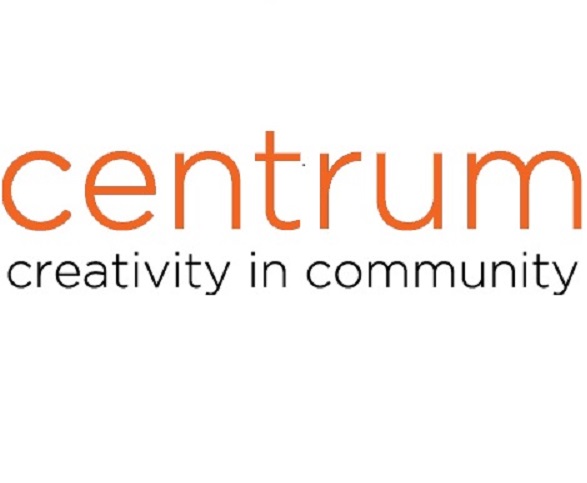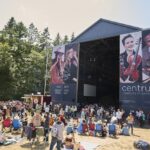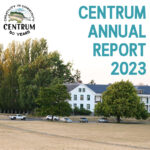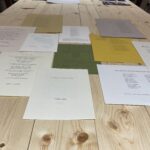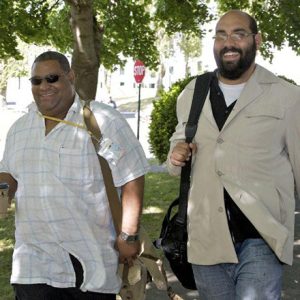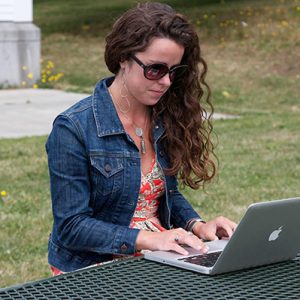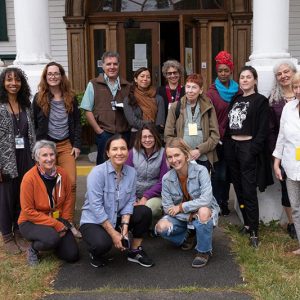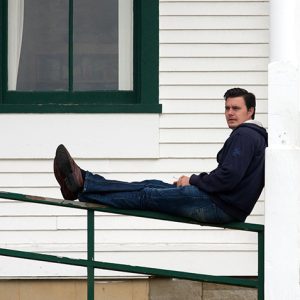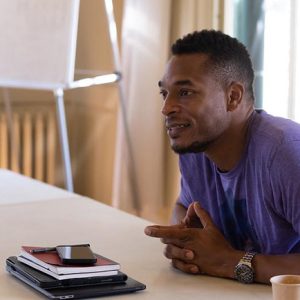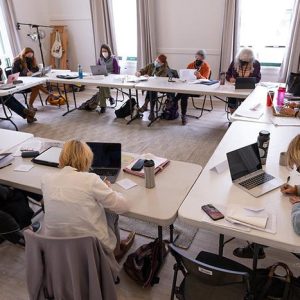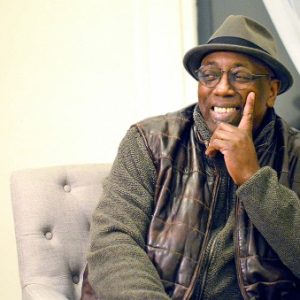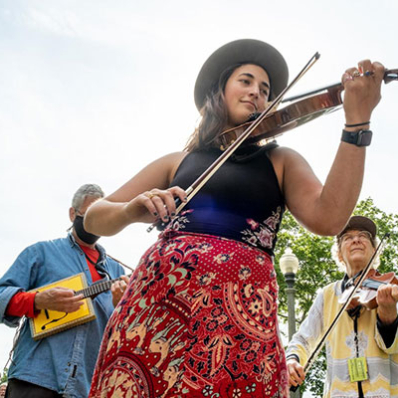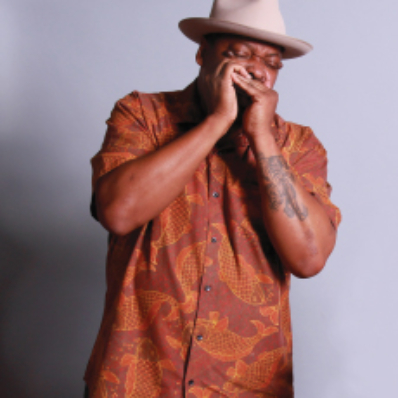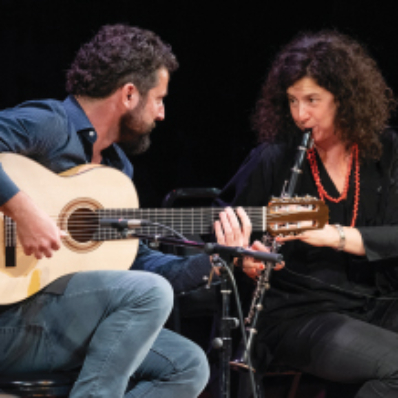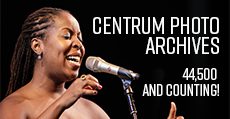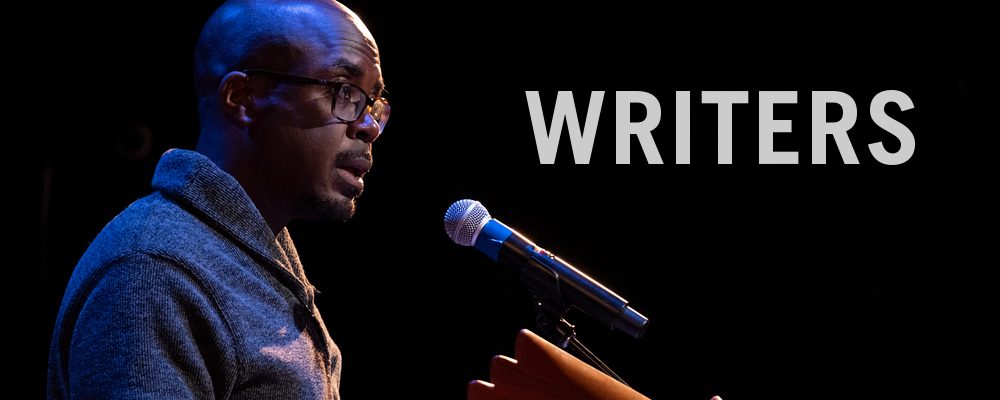
About Writers' Conference
July 14-20, 2024
Since 1974, Centrum’s writing programs have brought together aspiring and master artists to talk about craft, ignite creativity, connect learners and mentors, and build a diverse community.
The Port Townsend Writers Conference includes a week of generative, craft-centered workshops, lectures, and readings and communal gatherings in an environment designed to de-privilege the literary art form and serve diverse voices from across nations. Whether you consider yourself a beginning or seasoned writer, our approach is to provide an inspiring and inclusive space where writers can share their perspectives and take creative risks to improve their writing and the writings of our peers.
Take in craft lectures, open-mics, and readings, available for both in-person and online participation. Faculty offer lectures on literary writing and craft-focused workshops, all of which are recorded and available for multiple viewings by participants for up to three months post conference. The experience provides a multitude of inspirational opportunities and moments of quiet reflection as well as a space to make friends who understand and support the human and writing journey.
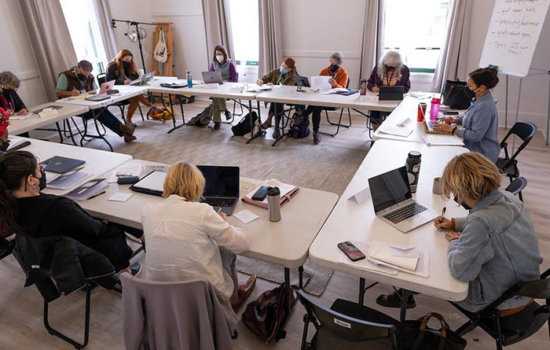
Writing Conference Facts
- Established in 1974
- Workshops, lectures, open-mics, and readings
- Sessions: poetry, fiction, non-fiction, memoir, visual storytelling
Welcome to The Writing Conference
Morning Intensive Workshops
Registration for a morning intensive workshop includes a writing workshop from 9:00 to 11:30 a.m., July 15 through 19 (5 sessions) with a faculty member of your choosing during the Port Townsend Writers Conference. It also includes access to all afternoon and evening programming, including craft lectures, afternoon workshops, and evening faculty readings at Fort Worden State Park. For biographies of our 2024 Faculty, scroll down to the 2024 Faculty menu.
Please note: Morning workshops are in-person only and capped at 14 people per morning workshop.
2024 Morning Intensive Faculty and Workshops
Quenton Baker – A Poet’s Toolbox: On Never Being Stuck
Is it possible to not rely on inspiration? To permanently evade writer’s block? In this generative workshop, we’ll develop and pursue strategies to avoid feeling stuck in your work and what it means to listen to the silences that we can interpret as blockage. This will include forms, research techniques, craft approaches, and other ways of ensuring that there are always fresh and bountiful approaches into your new work.
Matthew Olzmann - Defamiliarization and the Art of Strangeness (Poetry Workshop)
This workshop will explore the concept that poetry should “make the strange familiar, and the familiar strange.” Why is that important and how do we do that? How does a poem take something ordinary and charge it with wonder and mystery? How does something wild and surreal somehow feel connected to our daily lives? We’ll likely talk about how surprise works—how it is created and what it does—as we explore the possibilities of strangeness. This will be a generative workshop where we’ll write and discuss new poems. Hopefully, when we’re done, we’ll have a handful of new poems, ideas for poems we’ve yet to begin, and a few new tools to carry out into the odd world of our art.
Rena Priest - Only You (and your reader): A Generative Poetry Workshop
In this workshop, we will explore the confluence of influence, originality, audience, and identity. It’s been said that there is nothing new under the sun, and yet, there is you and the work that only you can create. Additionally, there is an inimitable collaboration between you and your reader. As Mary Oliver says, “Readers want poems that will bring them news of their lives…” We will workshop your poems, asking what is yours and yours alone, what comes from what came before, and what extraordinary news is gleaned from the quotidian. Poets will bring two poems to be workshopped and two poems that have influenced their work.
Laura Read – The Long (and Winding) Road (Poetry Workshop)
In this workshop, we’ll read poems, long and short, that take multiple turns, that swerve even, and write poems that surprise us and our readers. One of the elements in these poems we’ll study is the way poems can “warp the ordinary progress of time,” as Virginia Woolf once said letters can do. Poetic turns can shuttle us quickly between subjects or places but also between moments. This class will be a combination of discussion of example poems, generative exercises based on those poems, and workshops of the poems we write. Some of the poets whose work we’ll study to inspire us include Diane Seuss, Morgan Parker, Kathryn Nuernberger, and Natalie Diaz.
Jennifer Givhan - Balancing Between the Real and Surreal in Fiction (Fiction Workshop)
Description: Writing fiction in any genre is a balancing act between writing what feels “real” with what is artifice. The stakes are raised when writers begin balancing the real with the surreal, whether through our imagery, dreamworld, magical language, or when the supernatural creeps into our plots. In this workshop, we will learn to walk that tightrope between verisimilitude and the magical or strange, incorporating magical realism, surrealism, and worldbuilding that blurs boundaries between reality and the imaginary while grounding readers and asking them to suspend disbelief. As Haruki Murakami writes, “People say it’s magic realism – but in the depths of my soul, it’s just realism.” We will work toward bringing to the forefront of your work those elements of the supernatural, mythical, and/or dreamworld that illuminate deeper thematic issues and propel the narrative forward. We will examine how elements of the fantastical can deepen our understanding of what it means to be human and allow us perspectives outside the mainstream. From a craft lens, we will utilize magical realism and its variants to build propulsive storylines, immersive settings, and realistic characters that readers will root for.
Jonathan Evison – Novel Boot Camp (Fiction Workshop)
In this workshop, we will roll up our sleeves, set aside our excuses, and discover our best, most productive writerly selves. We will discuss and dissect the novel comprehensively, beginning with process. We will explore different approaches to process with regard to preparation, organization, workflow, rhythm, and habit. We will view the novel first through the lens of the reader, discussing the trust we must earn from the reader, the promises we must make and fulfill to the reader, and the expectations we must create in the mind of the reader to subvert and frustrate those expectations to emotional and intellectual effect.
Participants will provide fifteen copies of the first five pages of their novel, whether in progress, or in some form of completion. We will discuss these openings pages for what they ought to be: a window into the entire novel, a roadmap, a promise, the beginning of a long dance with the reader. We will discuss these openings pages for what they ought to be: a window into the entire novel, a roadmap, a promise, the beginning of a long dance with the reader.
Rion Amilcar Scott - Journey Through Fictional Forms (Fiction Workshop)
Depicting our busy and noisy world through fiction often requires taking on different forms, sometimes in the same work, like slipping on new disguises, and personalities. In this generative workshop, we will look past traditional narration and try on differing cloaks: for example, the flash, the epistolary, the satiric, found forms, etc. We will read works that play with form and then create new pieces during meditative free writes. Participants will be encouraged to re-think their free-written pieces through the lens of form. By the end of the week, participants will have explored and discovered new approaches for their narrative experiments.
Kate Lebo - But How Do We Know? (Finding Your Authority in Nonfiction)
We don’t, or we kind of do. We know that if our essays are easily summed up, we’re missing something. We know that if we end with the idea we started with, we’ve failed. As creative nonfiction writers, how can we build our authority while embracing the essential mystery of our work? How do we become conscious of our limits and biases, find the holes in our expertise and memories, and use them to create greater risk and meaning?
In this class, we’ll examine the different strategies writers use to create authority while not-knowing. We’ll explore how trusting ourselves and engaging with not-knowing can deepen intellectual honesty, personal vulnerability, and artistic surprise. We’ll read essays from writers like Jamaica Kincaid, Helen Garner, and David Foster Wallace and consider how they engage with certainty and doubt. Then we’ll practice moving forward in our work even (especially!) when we don’t know where we’re headed. You will write an essay, starting from what you don’t know and expanding the essay session by session. We will workshop essays as we go, in their unfinished, unknowing stages, discussing the fundamentals of how we use research, personal history, and ideas to build something larger than what the essay is “about." At the end of our week together, you will leave with a draft and a practice for how to open your own essays to many ways of knowing and not-knowing.
Sasha LaPointe - Writing Through Trauma and Into Resilience: The Healing Art of Personal Narrative (Nonfiction Workshop)
How do we take our most vulnerable stories and turn them into power? Creating art from our experiences isn’t easy. It can often feel as if we’re only sinking in the swamp of memory rather than pulling ourselves up by a branch we may not have noticed. In this workshop I hope to help you discover whatever your branch may be and work to craft a narrative of not only surviving, but finding our way to healing. We will discuss the complexities of being a narrator both vulnerable and empowered and challenge the expectations of traditional memoir.
In this class we will examine different styles of personal narrative, including lyric and hybrid forms, as well poetry and personal essay. There will be generative prompts each session, as well as time to share and discuss our work, and a chance to give and receive feedback in a light workshop environment.
Bettina Judd - Grief in Hybridity (Nonfiction Workshop)
In this workshop, we will explore the expansive possibilities of the prose form to do the difficult work of working through, documenting, and expressing grief. With an understanding that grief expands beyond the page, lingers, troubles, and interferes, this nonfiction workshop asks that we travel through multiple modes of creative writing to assist prose in offering more than the expository, as grief exposes. In this workshop, we will read the works of established writers in their contemplations of grief and loss, and experiment with voice and structure to do our due diligence to the serious matter of tending to our ghosts.
Afternoon Workshops
Registration for a morning intensive workshop includes access to all afternoon workshops, craft lectures, and evening faculty readings at Fort Worden State Park during the Port Townsend Writers Conference.
Registration for afternoon workshops only includes access to all afternoon workshops, craft lectures, and evening faculty readings at Fort Worden State Park during the Port Townsend Writers Conference.
The afternoon workshops which are offered in hybrid format (indicated below) will be available to in-person and online participants. All afternoon craft lectures and faculty readings are also broadcast online and recorded for viewing up to three months after the Port Townsend Writers Conference for in-person and online participants.
2024 Afternoon Faculty and Workshops
Kristen Millares Young - Telling Your Own Story
Our life stories are a means for connection—a tender offering in a troubled era. Part reportage and part reflection, personal essays can reveal hidden truths about ourselves, our families, and our societies. In this interactive and generative writing workshop, I will help participants tell their own stories. Available in English and Spanish, we will begin with a one-page reading from Gloria Anzaldúa’s “How to Tame a Wild Tongue” to inspire group discussion, followed by timed prompts that will guide you individual writing sessions. By weaving together community narratives, we can craft a vision for our future that includes hope and the capacity for unexpected change.
Kristen Millares Young - Architecture of the Unsaid
When we compel readers to think through the choices of our characters, we create empathy with craft. During this generative workshop, you will write in response to a series of timed prompts in the form of questions applied to your protagonist, whether fictional or the “I” of memoir. We will begin with, “What is the hardest thing that has gone unsaid in your life?” From there, I will guide your exploration with questions that help establish the time frame, setting, characters, and context. Finally, I will ask you to consider the various intersecting complicities, whether personal or institutional, which produced that narrative silence. We will go there, but we will not share what we write during this workshop, remembering that we can exercise discretion in revision.
Kristen Millares Young - How to Write a Family Portrait (Bilingual, Hybrid)
Tell the stories that have preoccupied, amused, and defined your family for generations. In this hour-long generative writing workshop, essayist Kristen Millares Young will use guided prompts and discussions to help you plan, write, and revise your family stories. By reflecting on intimate truths, we can redefine how we think about ourselves and our kin, contribute to our communities, and spark vital conversations.
This workshop is offered in both English and Spanish. Participants will leave with new pages.
Cuente las historias que han preocupado, divertido y definido a su familia por generaciones. En este taller de escritura generativa de una hora de duración, la ensayista Kristen Millares Young utilizará sugerencias guiadas y discusiones para ayudarle a planificar, escribir y revisar sus historias familiares. Al reflexionar sobre algunas verdades íntimas, podemos redefinir como pensamos acerca de nosotros mismos y nuestros familiares, contribuir a nuestras comunidades y generar conversaciones vitales.
Este taller será ofrecido en inglés y en español. Los participantes saldrán con una nueva perspectiva.
Kim Addonizio – Make a Book: Shaping your Poetry Manuscript
Do you have a few handfuls of poems you’re hoping to turn into a chapbook or full-length collection? This lecture/conversation will guide you through how some authors have structured their own books of poems and give you some guidelines and ways to think about the themes and subjects of your work. We’ll also tackle subjects like readiness to publish, the value of “leaner and meaner” manuscripts, and submitting to contests vs. small press publishers.
Kim Addonizio – Living Spherically: Exploring Failure, Collaboration, and Community
“You have to live spherically - in many directions. Never lose your childish enthusiasm - and things will come your way.” -filmmaker Federico Fellini
In this workshop, I’m going to talk for a bit about my own creative journey and how Fellini’s concept has been a touchstone for exploring and expanding my literary path—and how it can be one for you, as well. I’ll be joined by my partner, guitarist Danny Caron, to show you and discuss a couple of our collaborations and talk specifically about how you might work with a musician to broaden the direction of your own work. Musical experience is not a requirement; this is a class meant to open you up to new possibilities. There will be a handout of prompts for you at the end related to writing to or about music.
Kim Addonizio – Writing and Memory (Hybrid)
“You own everything that happened to you.”—Anne Lamott
This workshop will be focused mostly on poetry examples, but it will have valuable ideas and information for personal essay writers, as well. We’ll focus on writing your memories, with discussion, examples, and in-class writing prompts designed to help you mine the rich territory of your past. We’ll generate several seeds for future work and look at some ways to structure your material. You should leave this workshop with a handful of beginnings, as well as many ideas to inspire further exploration.
Stephanie Land - The Business of Writing (Hybrid)
What’s the big difference between saying “I like to write” and “I am a writer”? The answer lies in the business of writing. From branding to business cards, from health care to taxes, (not to mention insider information on how to find clients, agents, and editors; how to pitch an article) and how to shop around a book. This class is centered on non-fiction writing and is not generative. In this three-part afternoon workshop series, we will discuss the nuts and bolts of being the CEO of your writing business and growing a platform that makes the publishing industry happy.
Session 1: Finding your inner expert and learning how to pitch, place, and publish essays, op-eds, and reported pieces. (Hybrid)
What did you read today? What should you write? What’s your niche? What are you an expert in? What are you passionate about? What are your writing goals? These are all important questions to ask yourself before embarking on a career as a professional writer. Come to class prepared to answer those questions, and we'll discuss personal brand and marketing strategies, all things self-promotion, and when to seek help from a brand specialist and/or social media manager. Once we've brainstormed our individual brands, we'll discuss where to find editors of publications and how to pitch them while going over the different types of content writing. If time allows, we will go over individual pitches, their structure, and what gets them noticed
Session 2: Get Paid! Show me the money! Fuck You, Pay Me! TAXES. And...ask me anything about getting a book deal. (Hybrid)
Was your pitch accepted and your piece published? GREAT!! Now, the fun part: getting paid!! What paperwork should you expect to fill out before you get that sweet sweet direct deposit? Do you need an invoice? What are some magic words to get more money? What to do if you're not getting paid? We'll also discuss when to hire an accountant, become an LLC, and keeping track of your expenses/deductions. In this session, we'll go over what to do if an agent shows interest in you and your work, and what it means to write a "book proposal" and get a "book deal."
Session 3: All things social media with guest instructor Micaela Williams, Stephanie's social media manager. (Hybrid)
So you've got your brand, a few published pieces, and a pretty snazzy website. Now what? You grow your platform. This can be through social media, newsletters, attending conferences, taking classes, and just having an online presence. What's an online presence? Well...posting content and being active online. All of your burning social media questions will be answered, like: What makes a good TikTok video? Do I need BlueSky, Threads, and a public Facebook page? What social media platforms matter the most? How do you use them, how do you network, and how do you grow your numbers through each of those? We'll also go over what the Big Five book publishers want to see in the marketing and reach section of your book proposal, and how to start bulking that up now. Yes, now. Micaela Williams will join Stephanie in sharing insider secrets to creating reels and TikToks that get noticed.
Sam Ligon - The Told Story
Fiction is a dramatic form, often revealing characters and stories through scene — action, description, and dialogue, frequently woven with a character’s thoughts or observations. Effective scenes tend to be shown, allowing the reader to draw conclusions based on what’s been rendered. But stories can also be told, sometimes in the case of expository sections, and sometimes almost entirely. Show, don’t tell, we’re told early and often. But some stories gain power through summary, withholding scenic opening and revelation until very late in the narrative, creating a kind of distance between a first person narrator and the action she’s revealing. Dialogue in these stories might be entirely summarized, scenes taking on elliptical qualities, often shaped by lists. But the story and the protagonist must still be revealed in depth and complexity, without explanation or reduction, the story creating context and mystery as it unfolds. In this class we’ll read and discuss two stories, Jhumpa Lahiri’s “The Boundary” and Donald Barthelme’s “The School,” examining how a told story can be complete, complex, and beautiful, while still creating space for a reader to draw conclusions and shape meaning
Sam Ligon - Negative Space in Fiction
While we’ve all heard the writing advice to “show, don’t tell,” just as important to fiction is what we don’t show or tell—what we reveal through absence or omission. Musicians and composers use silence in song to create tension and meaning and contrast against sound. Painters use negative space around a subject to create contrast and to heighten color and composition in the subject itself. In fiction, what’s not revealed, and how it’s not revealed, often creates a gravity of absence, a kind of shadow effect, which can inform character and meaning in story. In “Death in the Afternoon,” Hemingway wrote that “If a writer of prose knows enough about what he is writing about he may omit things that he knows, and the reader…will have a feeling of those things as strongly as though the writer had stated them. The dignity of movement of the iceberg is due to only one-eighth of it being above water.” In this class, we’ll discuss Hemingway’s “iceberg principle,” or what Amy Hempel refers to as “negative space,” using two stories as examples of creating shape, meaning, and gravity through absence or omission — Hemingway’s “Hills Like White Elephants,” and Hempel’s “Today Will Be a Quiet Day.”
Valerie Miner - Sometimes You Make Music
A workshop in which we discuss the importance of stillness, attention, observation and serendipity to successful literary writing. I’ll cite other painters, composers as well as writers who address the issues of living in a virtual world in which if feels as if there’s no here, here and no now, now. Our references include Igor Stravinsky, Joyce Carol Oates, Patricia Jones, the Buddha, and Keith Richards.
We’ll discuss such questions as: How do we prepare to enter our work? What distracts us from work? How do we return? How do we attend to the senses in our work? What do we do to enhance our awareness of the world and our exercise of observation?
We’ll consider what these words (practices) mean to each of us: Attention. Attendance. Awareness. Absorption. Alertness. Concentration. Consideration. Contemplation. Deliberation. Focus. Presence. Reflection. Receptiveness. Responsiveness. Rapture. Stillness.
A resource sheet will is available for further individual exploration.
Valerie Miner - Casting Shadows/ Hearing Voices
Finding Voice through POV. A workshop about the importance of persona and point of view in fiction and non-fiction. Point of view is one of the most basic elements in narration. Through this medium, storytellers see (hear, feel, smell, taste) from particular consciousnesses and metabolisms as well as from temporal and spatial perspectives. Since most contemporary narration involves a “growth of perception” (among characters and readers), the locating of the viewpoint is crucial to hearing the voice of the story. We’ll discuss work by Gish Jen, WB Yeats, Randall Kenan, Margaret Atwood and others. We’ll
do exercises to expand our range of voices and the workshop will end with a resource sheet for individual exploration.
Claudia Castro Luna - Roads to Travel
Every poem is an invitation to travel. Come with me, the poet says, along this road I’ve created. A poet succeeds who is able to draw a path clear enough for the reader to follow. No double takes, re-readings, fishing for meaning, no rough terrain, but a translation as close as possible from the writer’s inner self to the reader’s ears and mind. The feat hinges on how effectively the poet deploys image, syntax, figurative language, and other literary devices. We’ll read and discuss poems that challenge and enchant, by poets as distinct as Juliana Spahr, Anne Carson, and MK Chavez.
Claudia Castro Luna - Pas de deux
1) « Pas de deux » from the French, literally meaning, “step of two.” In classical ballet the term refers to a duet in which two dancers perform steps together. 2) According to the Academy of American Poets, a couplet is “two successive lines of poetry, often rhymed.” 3) Ghazals are poems written in couplets, five at a minimum, but they can be much longer. 4) In our time together, we’ll look at how poets have used couplets to advance their speculations. We’ll also read several ghazals from a wide spectrum of writers, some writing currently and others who wrote centuries ago. Finally, we’ll practice writing couplets that complement each other and move like a “pas de deux” on the page.
Susan Landgraf - Writing about Weaving Brooms Is a Political Act
In these times of upheaval across the globe, we must dare more than ever to confront mayhem and conflict with words. In an interview with Bill Moyers, poet Naomi Shihab Nye said, “…people ask how come you don’t write more political poems? I say, ‘Oh, but I do.’ Poems such as The Man Who Makes Brooms: These are my political poems, these poems…”
Making brooms, bathing a patient, baking bread – these are tangible things that someone knows how to make or do to keep the world running in spite of tragedies and trauma. A poem that celebrates an act or moment of someone loving or caring or creating can restore a sense of faith in both the poet and the reader. We’ll look at several political poems by Nye and others and then write a political poem, keeping in mind Nye’s definition: “The dignity of daily life, that is politics, you know, how somebody carries themselves regardless of the situation around them.”
Susan Landgraf - Epiphanies
An epiphany is not as scarce as a Monarch butterfly in Seattle in December. In this workshop we’ll look at what makes an epiphany and how to find one or two by looking for that which we haven’t seen before. Czeslaw Milosz in A Book of Luminous Things writes that an epiphany “interrupts the everyday flow of time and enters as one privileged moment when we intuitively grasp a deeper, more essential reality hidden in things and persons.” They’re out there, he says. All we have to do is “capture and preserve one moment, which becomes, indeed eternal.” We capture that moment or moments by being observant and using precise, accurate details.
What are those moments? We’ll look at several short poems and how they capture a moment out of time that lasts forever; brainstorm a list of things we hadn’t, perhaps, thought about before; and write at least one poem that captures one spider spinning its web or an iris opening or a lover leaning over his beloved in a dream.
Dawn Pichón Barron - The Collage Poem
Need inspiration? A break from a project? A tactile pursuit that still fulfills the need to write? Join this afternoon workshop and experience the art of creating collage poems. The purpose of this workshop is to 1) expand critical thinking skills through analysis of outside texts 2) increase skills in organization and meaning-making 3) articulate visual literacy analysis and 4) examine and articulate processes. We will begin by discussing examples of collage poetry in the form of text or word art (such as Jenny Holzer, John Ashbery, Joe Brainard, Star Black, Guerilla Girls and more) and identifying poetic/literary devices used (alliteration, metaphor, personification, repetition, and so forth). By exploring and practicing erasure poetics, ekphrastic poetry, and concrete (or shape) poems, we will generate written poems before the journey of creating a collage poem. Students will share (if they choose) their poem and the process of its creation.
Students need to bring COPIES of the following to class: A favorite (or least favorite) poem or prose passage (no more than two pages, single-sided) AND one image (any picture, photo, drawing, illustration, etc.) No originals. All other materials will be provided.
Dawn Pichón Barron - Why Stand on a Silent Platform?: Poetry of Witness (Hybrid)
This workshop is for poets AND writers of any level AND genre(s)–all are welcome to join this learning community to explore, examine, and create poetry of witness. We will begin with a brief discussion of the origins and purpose of “poetry of witness,” following Carolyn Forché’s description within “Reading the Living Archives: The Witness of Literary Art: To hell and back, with poetry”:
In the poetry of witness, the poem makes present to us the experience of the other, the poem is the experience, rather than a symbolic representation. When we read the poem as witness, we are marked by it and become ourselves witnesses to what it has made present before us…Witness begets witness. The text we read becomes a living archive.
This workshop is designed to generate thought and feelings, writing, and community sharing/connection. In contemporary globally connected society, poems of witness can be a piece of the resistance by un-silencing the atrocities against humanity that many have become desensitized to. Poetry of Witness is not a place to perch upon a soapbox (but you could create a poem in the shape and essence of a literal and metaphorical soapbox); it is to bear witness to a specific event or issue, writing from individual, not collective mind-speak. Students will leave this workshop with an understanding of poetry of witness, a list of topics, pre-writing and mind-mapping, and the beginnings of poem (or prose). Content Courtesy: We will be reading, discussing, and writing about topics that are traumatic and polemic; therefore, as a community we will be open-minded, respectful, and self-reflective. “Why Stand on a Silent Platform?” in the title is from Rage Against the Machine (1992, “Township Rebellion”).
Dawn Pichón Barron - Speculative Fiction & Indigenous Futurisms (Hybrid)
This is an inclusive workshop designed to explore personal identity and collective, ancestral memory through the lens of Indigenous futurisms/speculative fiction as a tool for expanding one’s understanding of the cosmos. Writers of all genres are welcome to this exploratory learning community. Indigenous speculative fiction, formed from Afrofuturism, examines the spaces between history and future, engages a re-imagining of time and place, and as with Indigenous ways of knowing, this writing “genre” embraces the intersections of multiple genres to create a whole. Grace L. Dillon wrote that Indigenous Futurisms “involves discovering how personally one is affected by colonization, discarding the emotional and psychological baggage carried from its impact, and recovering ancestral traditions in order to adapt in our post-Native apocalypse world.”
Through guided writing exercises, students can expect to have pieces of plot, themes, setting(s), and character sketches. Writers are often motivated to create stories by questions such as what if…why is…how does…; these are the same questions that seed the fertile ground of Indigenous Futurisms and will guide us during the writing portion of this workshop. Students will draft a short creative speculative fiction piece based on their own worldview, cultural identities, and epistemology.
2024 Faculty
Writing Program Faculty

Kim Addonizio
Afternoon Workshop FacultyKim Addonizio is the author of seven poetry collections, two novels, two story collections, and two books on writing poetry: The Poet’s Companion (with Dorianne Laux) and Ordinary Genius.

Rion Amilcar Scott
Morning Workshop Faculty
Rion Amilcar Scott is the author of the story collections The World Doesn’t Require You and Insurrections, which was awarded the 2017 PEN/Bingham Prize for Debut Fiction and the 2017 Hillsdale Award from the Fellowship of Southern Writers. He teaches creative writing at the University of Maryland. His work has appeared in The New Yorker, The Kenyon Review, Best American Science Fiction and Fantasy 2020 and McSweeney’s Quarterly, among other publications.

Quenton Baker
Morning Intensive Faculty
Quenton Baker is a poet, educator, and Cave Canem fellow. Their current focus is black interiority and the afterlife of slavery. Their work has appeared in The Offing, Jubilat, Vinyl, The Rumpus and elsewhere. They are a two-time Pushcart Prize nominee, and the recipient of the 2018 Arts Innovator Award from Artist Trust. They were a 2019 Robert Rauschenberg Artist in Residence and a 2021 NEA Fellow. They are the author of we pilot the blood (The 3rd Thing, 2021) and ballast (Haymarket Books, 2023).

Claudia Castro Luna
Afternoon Workshop
Claudia Castro Luna is an Academy of American Poets Poet Laureate fellow (2019), WA State Poet Laureate (2018 – 2021) and Seattle’s inaugural Civic Poet (2015-2018). She is the author of Cipota Under the Moon (Tia Chucha Press, 2022); One River, A Thousand Voices (Chin Music Press); the Pushcart nominated Killing Marías (Two Sylvias Press) also shortlisted for WA State 2018 Book Award in poetry, and the chapbook This City (Floating Bridge Press).…

Gary Copeland Lilley
Artistic Director, Writers Conference
Gary Copeland Lilley is the author of eight books of poetry, the most recent being The Bushman’s Medicine Show (Lost Horse Press, 2017), and a chapbook, The Hog Killing (Blue Horse Press, 2018). He is originally from North Carolina and now lives in the Pacific Northwest. He has received the DC Commission on the Arts Fellowship for Poetry and is published in numerous anthologies and journals, including The Best American Poetry 2014, Willow Springs, The Swamp, Waxwing, Taos Journal of Poetry and Art, and African American Review.…

Jonathan Evison
Morning Workshop Faculty
Jonathan Evison is the New York Times Bestselling author of the award winning novels All About Lulu, West of Here, The Revised Fundamentals of Caregiving, This is Your Life, Harriet Chance!, Lawn Boy, Legends of the North Cascades, Small World, and Again and Again. Sherman Alexie has called Evison “the most honest white man alive.” He lives in Western Washington with his wife and three children.

Jennifer Givhan
Morning Workshop Faculty
Jennifer Givhan is a Mexican-American and Indigenous poet and novelist from the Southwestern desert and the recipient of poetry fellowships from the National Endowment for the Arts and PEN/Rosenthal Emerging Voices.
She is the author of five full-length poetry collections and three novels, most recently Belly to the Brutal (Wesleyan University Press) and novel River Woman, River Demon (Blackstone Publishing) which draw from her practice of brujería.…

Bettina Judd
Morning Workshop Faculty
Bettina Judd is an interdisciplinary writer, artist and performer whose research focus is on Black women’s creative production and use of visual art, literature, and music to develop feminist thought. Her book Feelin: Creative Practice, Pleasure, and Black Feminist Thought (Northwestern University Press, December 2022) argues that Black women’s creative production is feminist knowledge production produced by registers of affect she calls “feelin.” She is currently Associate Professor of Gender, Women, and Sexuality Studies at the University of Washington.…

Stephanie Land
Afternoon Workshop Faculty
Stephanie Land is the New York Times bestselling author of “MAID: Hard Work, Low Pay, and a Mother’s Will to Survive,” called “a testimony…worth listening to,” by the New York Times and inspiration for the Netflix series “Maid,” and its sequel “CLASS: A Memoir of Motherhood, Hunger, and Higher Education.” Her work has been featured in The New York Times, The Guardian, The Atlantic, and many other outlets.…

Susan Landgraf
Afternoon Workshop Faculty
Susan Landgraf is a poet and journalist. She has published more than 400 poems, essays, and articles in numerous journals and magazines. Most recently her poems have appeared, or are forthcoming, in Prairie Schooner, Poet Lore, Nimrod, Calyx, The Bellingham Review, Literary Mama, Kestrel, Margie, and The Sow’s Ear. She is the author of What We Bury Changes the Ground (Tebot Bach, 2017) as well as The Inspired Poet (Two Sylvias Press, 2019), a book of writing exercises.…

Sasha LaPointe
Morning Workshop Faculty
Sasha LaPointe is from the Upper Skagit and Nooksack Indian Tribe. Native to the Pacific Northwest, she draws inspiration from her coastal heritage as well as her life in the city.

Kate Lebo
Morning Workshop Faculty
Kate Lebo’s first collection of nonfiction, The Book of Difficult Fruit (FSG), won the 2022 Washington State Book Award and was named a best book of the year by NPR, The Atlantic, New York magazine, Electric Literature, and The Globe and Mail. She is the author of the cookbook Pie School (Sasquatch Books), the poetry chapbook Seven Prayers to Cathy McMorris Rodgers (Entre Rios Books), and co-editor with Samuel Ligon of Pie & Whiskey: Writers Under the Influence of Butter and Booze (Sasquatch Books).…

Sam Ligon
Afternoon Workshop Faculty
Sam Ligon’s most recent novel — Miller Cane: A True & Exact History — was serialized for a year in Spokane’s weekly newspaper, The Inlander, as well as on Spokane Public Radio.

Kristen Millares Young
Afternoon Workshop Faculty
Kristen Millares Young is the author of the novel Subduction, named a staff pick by The Paris Review and called “whip-smart” by the Washington Post, “a brilliant debut” by the Seattle Times and “utterly unique and important” by Ms. Magazine.

Valerie Miner
Afternoon Workshop Faculty
Valerie Miner is the award-winning author of 15 books. Her work has appeared in Ploughshares, The Georgia Review, Triquarterly, Salmagundi, New Letters, Prairie Schooner, The Gettysburg Review, over 60 anthologies, and on BBC Radio 4. Winner of a Distinguished Teaching Award, she has taught at Stanford University, U.C. Berkeley, University of Minnesota, Arizona State University, etc.…

Matthew Olzmann
Morning Workshop Faculty
Matthew Olzmann is the author of Constellation Route as well as two previous collections of poetry: Mezzanines and Contradictions in the Design. A recipient of fellowships from Kundiman, MacDowell, and the National Endowment for the Arts, Olzmann’s poems have appeared in the New York Times, Best American Poetry, The Pushcart Prizes, Kenyon Review, and elsewhere. He is an assistant professor at Dartmouth College and also teaches in the MFA Program for Writers at Warren Wilson College.

Dawn Pichón Barron
Afternoon Workshop Faculty
Dawn Pichón Barron (she/her) is a mixt-blood Indigi-Euro writer & scholar born in Southern California and primarily raised in rural Spokane. She is the academic director of the Native Pathways Program and member of the Faculty at The Evergreen State College. Dawn is thrilled to participate in state-wide artist promotion and sustainment as an Artist Trust Board Member.…

Rena Priest
Morning Workshop Faculty
Rena Priest is a member of the Lhaq’temish (Lummi) Nation. She is the incumbent Washington State Poet Laureate and Maxine Cushing Gray Distinguished Writing Fellow. Priest is also the recipient of an Allied Arts Foundation Professional Poets Award and fellowships from Indigenous Nations Poets and the Vadon Foundation.

Laura Read
Morning Workshop Faculty
Laura Read is the author of But She Is Also Jane (University of Massachusetts Press, 2023, winner of the Juniper Prize); Dresses from the Old Country (BOA Editions, 2018); Instructions for my Mother’s Funeral (University of Pittsburgh Press, 2012, winner of the AWP Donald Hall Prize for Poetry, selected by Dorianne Laux), and The Chewbacca on Hollywood Boulevard Reminds Me of You (winner of the Floating Bridge Press Chapbook Award, 2011).…
2024 Cost
Centrum has a variety of ways to be able to attend our workshops even if you’re on a budget. If you need financial assistance, Centrum has a robust scholarship program awarded on a first-come, first-served; and as-needed basis.
Tuition:
Morning Intensive: $975
Afternoon Workshops: $550
First Impression 1-on-1 Writing Consultation with an Editor: $80
Those who register for the Morning Intensive get access to their choice of a morning faculty member as well as access to all drop-in afternoon workshops. Morning faculty classes are limited to 14 people and registration fills quickly.
Housing:
Private Dorm Room: $550
Dorm room with a view: $650
Shared apartment: $950
Meals:
All meals: $365
Transportation:
Shuttle from Seatac 7/14: $60
Shuttle to Seatac 7/20: $60
Scholarships
Apply online as you register. Please note that except in rare cases, scholarships are available for tuition only, not housing and meals. Centrum requires a $50 deposit of scholarship applicants, which is fully refundable if you do receive a scholarship and choose not to attend the conference.
If we haven’t answered all of the questions you may have, please contact Eric Greenwell at 360-385-3102, x131, or egreenwell@centrum (dot) org.
FAQ
Scholarships
Apply online as you register. Please note that except in rare cases, scholarships are available for tuition only, not housing and meals. Centrum requires a $50 deposit of scholarship applicants, which is fully refundable if you do receive a scholarship and choose not to attend the conference.
If we haven’t answered all of the questions you may have, please contact Eric Greenwell at 360-385-3102, x131, or egreenwell@centrum (dot) org.
Schedule
Here is how you’ll spend your time during the Conference, depending upon your desired tuition. Please note, all times are Pacific Standard Time.
Check-in Day - Sunday, July 14
4–5:15pm – Check-in, Centrum office
5:15–7pm – Dinner (for participants who register for meals)
7pm – Orientation
Daily Schedule (Monday, July 15 through Friday, July 19)
7:30-9am - Breakfast (for participants who register for meals)
9-11:30am - Morning Intensive Workshops for in-person registrants - Morning workshops occur on campus at Fort Worden State Park and do not have a hybrid or online component.
11:30am-1:00pm - Lunch (for participants who register for meals)
1-1:50pm - Afternoon Craft Lectures (in person and online options) - Craft lectures occur on campus at Fort Worden State Park and are also broadcast to an online audience. Craft lectures are recorded and maintained for viewing for all participants for up to four weeks post-event, after which the recording is moved to Centrum's archives.
2-3:30pm - Afternoon Workshops (in person and online options) - Afternoon Workshops occur on campus at Fort Worden State Park while afternoon hybrid workshops are also broadcast to an online audience. Afternoon workshops are recorded and maintained for viewing for all participants for up to 3 months post the event, after which the recording will be deleted from our archives.
5-7pm - Dinner (for participants who register for meals)
7pm - PT Faculty Reading (in person and online)
All faculty readings at the PTWC are free and open to the public. We encourage all participants to come to the readings and to invite anyone they think might enjoy it. Readings occur on campus at Fort Worden State Park and are also live-streamed online.
Check-out Day - Saturday, July 20
7:30-9am Breakfast (for participants who register for meals)
9 a.m. Shuttle departs for SeaTac Airport (for participants who register for shuttle)
11 a.m. Fort Worden checkout
Online
If you can’t attend the Conference in person, we’ve become accustomed to coming to you online. Or maybe you just want to try us out before you commit to an in-person intensive.
For whatever reason, we’re committed to ensuring many of the same aspects of attending in person are preserved, including asking questions, sharing your work, and participating in discussions with faculty and other workshop participants.
Online registration gives you access to all afternoon craft lectures by our Morning Workshop Faculty, four hybrid afternoon workshops led by four members of our Afternoon Workshop Faculty, and all evening readings from all faculty. This content will be recorded as well as broadcast live, so you are able to view it for three months after the conference. After that time, recorded content from the Conference is moved to Centrums archives.
Afternoon Hybrid Workshops
Kim Addonizio – Writing and Memory (Hybrid)
“You own everything that happened to you.”—Anne Lamott
This workshop will be focused mostly on poetry examples, but it will have valuable ideas and information for personal essay writers, as well. We’ll focus on writing your memories, with discussion, examples, and in-class writing prompts designed to help you mine the rich territory of your past. We’ll generate several seeds for future work and look at some ways to structure your material. You should leave this workshop with a handful of beginnings, as well as many ideas to inspire further exploration.
Dawn Pichón Barron - Speculative Fiction & Indigenous Futurisms (Hybrid)
This is an inclusive workshop designed to explore personal identities, collective memory, and worldviews through the lens of Indigenous futurisms/speculative fiction as a tool for expanding one’s understanding of the cosmos. Writers of all designations and genres are welcome to this exploratory learning community. Indigenous speculative fiction, formed from Afrofuturisms, examines the spaces between history and future, a re-imagining of time and place, and as with Indigenous ways of knowing, this writing “genre” embraces the intersections of multiple genres to create a whole. Grace L. Dillon wrote that Indigenous Futurisms “involves discovering how personally one is affected by colonization, discarding the emotional and psychological baggage carried from its impact, and recovering ancestral traditions in order to adapt in our post-Native apocalypse world.” We will begin with terminology and identifying concepts such as speculative fiction, colonization, settler-colonialism, Indigeneity and (Indigenous) futurisms, moving into the personalization of colonization, ancestral knowledge and place, and lived experience to scaffold individual stories.
Through guided writing exercises, students can expect to have pieces of plot, themes, setting(s), and character sketches. Writers are often motivated to create stories by questions such as what if…why is…how does…; these are the same questions that seed the fertile ground of Indigenous Futurisms and will guide us during the writing portion of this workshop. Students will draft a short creative speculative fiction piece based on their own worldview, cultural identities, and epistemology.
Dawn Pichón Barron - Why Stand on a Silent Platform?: Poetry of Witness (Hybrid)
This workshop is for poets AND writers of any level AND genre(s)–all are welcome to join this learning community to explore, examine, and create poetry of witness. We will begin with a brief discussion of the origins and purpose of “poetry of witness,” following Carolyn Forché’s description within “Reading the Living Archives: The Witness of Literary Art: To hell and back, with poetry”:
In the poetry of witness, the poem makes present to us the experience of the other, the poem is the experience, rather than a symbolic representation. When we read the poem as witness, we are marked by it and become ourselves witnesses to what it has made present before us…Witness begets witness. The text we read becomes a living archive.
This workshop is designed to generate thought and feelings, writing, and community sharing/connection. In contemporary globally connected society, poems of witness can be a piece of the resistance by un-silencing the atrocities against humanity that many have become desensitized to. Poetry of Witness is not a place to perch upon a soapbox (but you could create a poem in the shape and essence of a literal and metaphorical soapbox); it is to bear witness to a specific event or issue, writing from individual, not collective mind-speak. Students will leave this workshop with an understanding of poetry of witness, a list of topics, pre-writing and mind-mapping, and the beginnings of poem (or prose). Content Courtesy: We will be reading, discussing, and writing about topics that are traumatic and polemic; therefore, as a community we will be open-minded, respectful, and self-reflective. “Why Stand on a Silent Platform?” in the title is from Rage Against the Machine (1992, “Township Rebellion”).
Stephanie Land - The Business of Writing (Hybrid)
What’s the big difference between saying “I like to write” and “I am a writer”? The answer lies in the business of writing. From branding to business cards, from health care to taxes, (not to mention insider information on how to find clients, agents, and editors; how to pitch an article) and how to shop around a book. This class is centered on non-fiction writing and is not generative. In this three-part afternoon workshop series, we will discuss the nuts and bolts of being the CEO of your writing business and growing a platform that makes the publishing industry happy.
Session 1: Finding your inner expert and learning how to pitch, place, and publish essays, op-eds, and reported pieces.
What did you read today? What should you write? What’s your niche? What are you an expert in? What are you passionate about? What are your writing goals? These are all important questions to ask yourself before embarking on a career as a professional writer. Come to class prepared to answer those questions, and we'll discuss personal brand and marketing strategies, all things self-promotion, and when to seek help from a brand specialist and/or social media manager. Once we've brainstormed our individual brands, we'll discuss where to find editors of publications and how to pitch them while going over the different types of content writing. If time allows, we will go over individual pitches, their structure, and what gets them noticed
Session 2: Get Paid! Show me the money! Fuck You, Pay Me! TAXES. And...ask me anything about getting a book deal.
Was your pitch accepted and your piece published? GREAT!! Now, the fun part: getting paid!! What paperwork should you expect to fill out before you get that sweet sweet direct deposit? Do you need an invoice? What are some magic words to get more money? What to do if you're not getting paid? We'll also discuss when to hire an accountant, become an LLC, and keeping track of your expenses/deductions. In this session, we'll go over what to do if an agent shows interest in you and your work, and what it means to write a "book proposal" and get a "book deal."
Session 3: All things social media with guest instructor Micaela Williams, Stephanie's social media manager.
So you've got your brand, a few published pieces, and a pretty snazzy website. Now what? You grow your platform. This can be through social media, newsletters, attending conferences, taking classes, and just having an online presence. What's an online presence? Well...posting content and being active online. All of your burning social media questions will be answered, like: What makes a good TikTok video? Do I need BlueSky, Threads, and a public Facebook page? What social media platforms matter the most? How do you use them, how do you network, and how do you grow your numbers through each of those? We'll also go over what the Big Five book publishers want to see in the marketing and reach section of your book proposal, and how to start bulking that up now. Yes, now. Micaela Williams will join Stephanie in sharing insider secrets to creating reels and TikToks that get noticed.
Kristen Millares Young - How to Write a Family Portrait (Bilingual, Hybrid)
Tell the stories that have preoccupied, amused, and defined your family for generations. In this hour-long generative writing workshop, essayist Kristen Millares Young will use guided prompts and discussions to help you plan, write, and revise your family stories. By reflecting on intimate truths, we can redefine how we think about ourselves and our kin, contribute to our communities, and spark vital conversations.
This workshop is offered in both English and Spanish. Participants will leave with new pages.
Cuente las historias que han preocupado, divertido y definido a su familia por generaciones. En este taller de escritura generativa de una hora de duración, la ensayista Kristen Millares Young utilizará sugerencias guiadas y discusiones para ayudarle a planificar, escribir y revisar sus historias familiares. Al reflexionar sobre algunas verdades íntimas, podemos redefinir como pensamos acerca de nosotros mismos y nuestros familiares, contribuir a nuestras comunidades y generar conversaciones vitales.
Este taller será ofrecido en inglés y en español. Los participantes saldrán con una nueva perspectiva.
Writers' Conference Events
No events found
|
- - - |
- - - |
- - - |
- - - |
- - - |
- - - |
- - - |
|
DN_T |
DN_T |
DN_T |
DN_T |
DN_T |
DN_T |
DN_T |
|
DN_T |
DN_T |
DN_T |
DN_T |
DN_T |
DN_T |
DN_T |
|
DN_T |
DN_T |
DN_T |
DN_T |
DN_T |
DN_T |
DN_T |
|
DN_T |
DN_T |
DN_T |
DN_T |
DN_T |
DN_T |
DN_T |
|
DN_T |
DN_T |
DN_T |
DN_T |
DN_T |
DN_T |
DN_T |
|
DN_T |
DN_T |
DN_T |
DN_T |
DN_T |
DN_T |
DN_T |
|
|
||||||
|
- - - |
- - - |
- - - |
- - - |
- - - |
- - - |
- - - |
|
DN_T |
DN_T |
DN_T |
DN_T |
DN_T |
DN_T |
DN_T |
|
|
||||||
You have no events for this day
You have no events for this month
You have no events for this month
No mapped events found in this timeline
Writers' Conference News
More Creative Programs
Centrum offers a variety of creative programs for artists of all ages,
experience the creative spirit.
